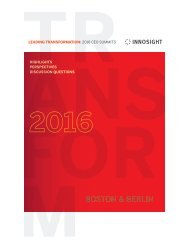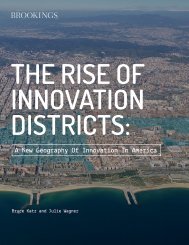TECHNOLOGY AT WORK
1Oclobi
1Oclobi
Create successful ePaper yourself
Turn your PDF publications into a flip-book with our unique Google optimized e-Paper software.
68<br />
Citi GPS: Global Perspectives & Solutions February 2015<br />
Because digital technologies can substitute<br />
labour for capital, productivity improves<br />
while wages do not<br />
Furthermore, digital technologies make it easier to substitute labour for capital.<br />
Although such substitution helps productivity, it does not boost wages. Instead it<br />
merely enhances the capital share of income, leading to a higher concentration of<br />
wealth. As a result, while income inequality is on the rise, the concentration of<br />
wealth is also striking. According to a recent study the wealthiest 0.01% of American<br />
families now control 11.2% of total wealth: about the same share as back in 1916,<br />
which is an all-time high. 103<br />
The relationship between wealth and income inequality across countries is however<br />
far from intuitive. In some countries like America, both are high, whereas places<br />
such as South Korea exhibit both low wealth and income inequality. Countries such<br />
as Switzerland and Denmark, on the other hand, have relatively low levels of<br />
income inequality, but also the highest levels of wealth inequality in the OECD. 104<br />
Perfect equality may not be desirable. Financial gain is important to spur risky<br />
entrepreneurship and innovation. This means, as Arthur Okun famously argued, that<br />
societies must make trade-offs between equality and efficiency. Nevertheless,<br />
extreme inequality can also lead to inefficiencies. Not least since income inequality<br />
tends to translate into inequality in wealth, health, and exposure to crime.<br />
Economic inequality often results in political<br />
inequality, which is a concern<br />
Furthermore, as highlighted in the recent book by Daron Acemoglu and James<br />
Robinson, Why Nations Fail, economic inequality often results in political inequality,<br />
where: “those with great wealth and easy access to politicians and policymakers will<br />
try to increase their power at the expense of society. That sort of hijacking of politics<br />
is a sure-fire way of undermining inclusive political institutions, and it is already<br />
under way in the US.” There are thus good reasons to be concerned by the rise of<br />
inequality.<br />
Automation, Inequality and the Equity Market<br />
Robert Buckland<br />
Chief Global Equity Strategist<br />
The booming stock market is part of the inequality story, but is it associated with<br />
automation? Automation is a key driver of productivity growth — the amount of<br />
output produced per worker. In turn, productivity is the key driver of long-term<br />
economic growth. Economic growth is the key driver of long-term corporate<br />
earnings per share (EPS). And finally, EPS growth is the key to long-term stock<br />
market returns. Equity investors have been clear beneficiaries of the economic<br />
gains associated with automation.<br />
That’s the long-term story. But can we find evidence that accelerating automation is<br />
proving especially beneficial for shareholders right now? And are workers losing out<br />
as a result?<br />
Whether technological innovation is driving capital substitution for labour is<br />
notoriously difficult to measure. One potential measure is the progression of profits<br />
relative to the number of company employees. We have aggregated both for the<br />
non-Financial listed US companies represented in the MSCI US benchmark. 105 We<br />
also show the same calculation for the MSCI EM Asia index, on which we comment<br />
more later.<br />
103 Saez and Zucman (2014).<br />
104 The Economist (2014b).<br />
105 This reflects the largest (often multinational) companies that dominate the US stock<br />
market. It closely tracks the S&P benchmark. Like the S&P, it omits the employment<br />
decisions of smaller unlisted companies which are important drivers of the US payroll<br />
data.<br />
© 2015 Citigroup










